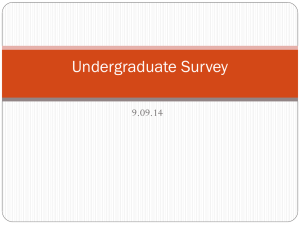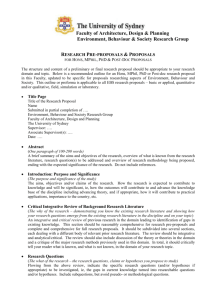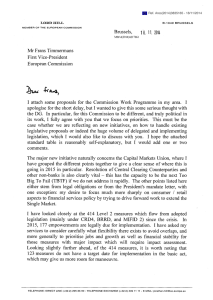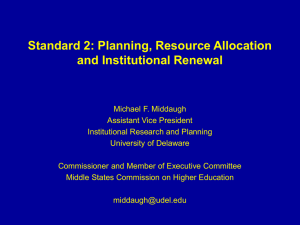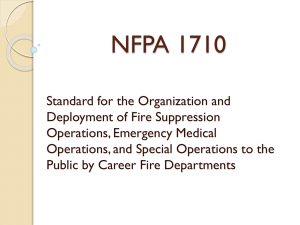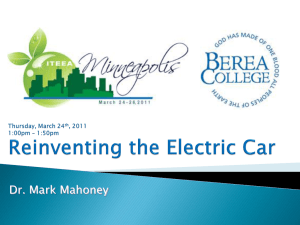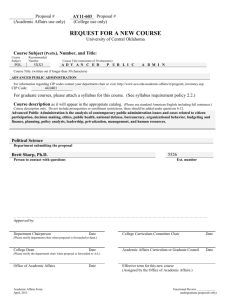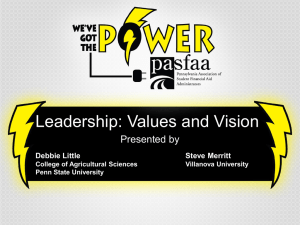Writing Successful Career Proposals My Experience
advertisement
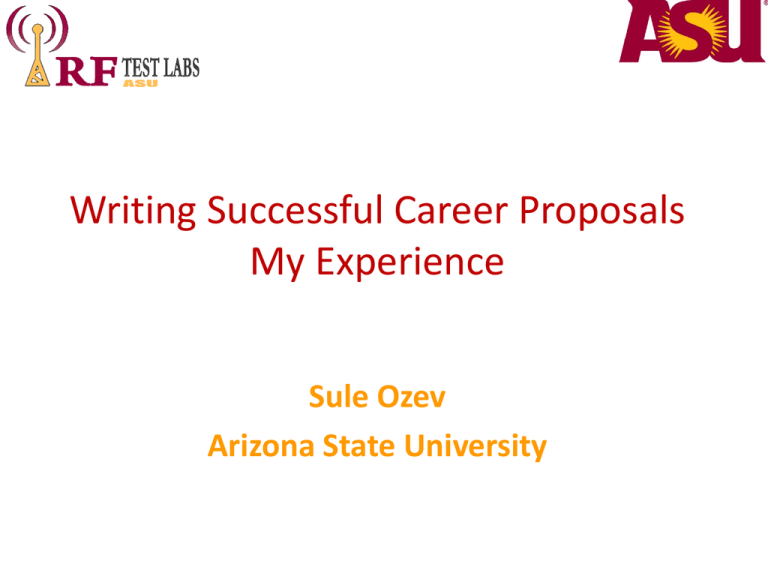
Writing Successful Career Proposals My Experience Sule Ozev Arizona State University Introduction • The following information I will present is based on – My own beliefs on how science moves forward – My own experience with the CAREER program • One reject, one accept – Feedback I received in both cases – Helping others write CAREER proposals – My observations during the CAREER panels I have served • They do not necessarily represent the position of NSF or its employees CAREER Program • Successful Proposals are generally based on this formula: – Visionary – High impact – Potential to jumpstart a successful career in the proposed area of research – Concrete career plan – Focus on integrating research and education Components of a CAREER Proposal • CAREER proposals are longer-term because they are intended to jump-start a successful academic career • Research plan – – – – – Problem statement Prior work Novel approach proposed Experimental plan Preliminary analysis of feasibility and potential impact • Career development plan – A clear path indicating how the PI’s career will move forward based on the results of the proposed work • Integrated education plan – CAREER proposals need to have a more concrete education plan Problem Statement • Visionary, high impact problem • Do not strive for incremental improvements on a well-known problem • Extensions of existing Ph.D. work rarely get attention • However background and expertise in the proposed area are required • Examples – Application of the expertise obtained during Ph.D. studies to a novel problem – Ideas that will potentially generate a paradigm shift in a given domain My Experience • Ph.D. in mixed-signal/RF circuit testing using high-level models • Noticed a glaring lack of statistical analysis techniques to fuse process variations with defect models • In an effort to be broad, wrote my proposal on the more generic problem of process variation analysis for analog circuits • Submitted to CCF • Got rejected • Reviews indicated that my strength was my expertise in fault models and test, so I needed to use that • My mistake: confusing “visionary” and “long-term” with “broad application” • A successful proposal does not have to solve all the problems related to a field, but it needs to make long-lasting impact on an important problem • 10 years from now, when this problem domain is addressed, will your name come up as a major contributor? • Will the solutions apply to problems that will surface in the future? Second Try • Refocused the ideas around fault-based testing • Has failed to produce any successful integration by the industry • Stalemate due to impractical approaches (due to high computational cost) and/or incomplete approaches (to reduce computational cost) • Proposed a fault-based test approach that used fault ranking, statistical fault definition, and is based on the hierarchical statistical analysis • Filled a gap in an otherwise developed field • How about long-term impact? • Argued for increasing need for structural, statistical, and fault-based test in the long term • Newer technologies are even more prone to defect, statistical variations, and entail higher complexity Prior Work • Thorough literature search in the proposed area is essential • 60-100 references are common • Better to group references in common themes • Depending on the structure, a convincing argument as to why other failed and why this proposal should succeed needs to be made – New problem, has not been addressed before – Resolve a major barrier to progress in a given field – Apply expertise from a different domain • Skipping relevant publications is not a good idea, however, bulk referencing rarely achieves the goal My Approach • Keeping the application area too broad came with potential risks on the prior work as well • With over 100 references, there were still a ton that I did not review/reference • Focusing the research area to within my expertise helped me narrow this list to a more relevant set • Cover existing research more thoroughly • Demonstrate that what I am proposing was indeed novel and was a paradigm shift compared with existing techniques • Of course, if you are applying your expertise to a new domain, you will need to read a ton of papers! Novelty • Based on my observations as a panelist, every proposal needs to have this aspect • CAREER proposals have a particular emphasis on novelty • What does it mean? – Challenging problem – New and superior approach • Needs to be clearly defined • The panel consists of both experts in your immediate field of research and experts in related fields • It is harder to convince people in your own domain of the superiority claim • It is harder to convince people in other fields of the challenging claim My Approach • In my first try, I explained the novelty and vision of my proposal implicitly • Not every panelist has the time or the background to sift through what you propose and why this is novel • In my second try, I had a more explicit explanation – What I propose to do – Why this is different from prior art – Why this is superior – Why this is visionary Experimental Plan • One of the crucial aspects of the proposal • Need to show that you have a clear plan to define success • Need to show that you have the means – Computational means – Experimental data – Equipment necessary Preliminary Analysis • Two components of preliminary analysis – Potential benefit – Feasibility or superiority • How much preliminary work is good? – 6-12 months of experience on the particular problem is necessary – 1-2 publications or accepted papers would be a bonus – Demonstration of ideas on a small scale – Demonstration of ideas on a smaller part of the overall problem • Visual representation of results – Graphs, tables need to be explained well, especially for people outside of the immediate area My Approach • My experimental plan had two parts: – Showing the proposed approaches had much better performance for academic-scale circuits – Showing that his can be applied to industry circuits • For the first part, I had some preliminary results, and laid out my ambitious goals • For the second part, I obtained letters from esteemed colleagues that they are interested and will support this effort Career Development Plan • How is this project going to jumpstart a successful career? • How will you take the results of this project and open a whole new horizon for yourself? • What can you do building up on this project? Education Plan • CAREER program has a higher emphasis on the education plan • What classes do you plan to teach/develop? • How can you use the results of this project to enhance the class material or develop new courses? • Can you integrate undergraduate students? How, what kind of projects? • Can you use the results of this project to update existing curriculum? If yes, make sure your chair gives an OK for that plan in her/his support letter My Approach to Education • I am a true believer in the value of educating young minds (no lip service!) • The plan should have a good mix of graduate and undergraduate classes to teach – I have been teaching a sophomore/junior level circuits oriented course, and developed a new course on RF/analog testing • What did I propose? – First of all, integrating new research into undergraduate curriculum is tough – I kept it simple • students never learn about defects, process variations, mismatch, etc. • Introduce these concepts and provide a few examples on how they effect overall performance, yield, profitability, etc. (more than enough for a junior-level course, may need to be even simpler for a sophomore-level course) • Demonstrate with an example how design and characterization are impacted by parametric and catastrophic defects (junior-level only) – Develop a course on analog/RF circuit testing • Not many courses offered on this subject (mine is one of 3 that I know of) • But, there is great interest and need to educate students in this field (I asked my support letter writers to indicate how their companies are struggling to find students with some level of knowledge) – I also defined a concrete, small, but teaching undergraduate project (senior project, or a specific undergraduate research program) • It is geared towards teaching defect modeling, simulation, and statistical simulation • It needs to be completed within one or two semesters (undergraduates do not hang around that long) • It needs to be achievable with limited background Broader Impacts • Standard lines: – Integrate with education, recruit minority students, involve undergraduates • These are generally adequate to check the box, but are not exciting without any details • Examples of what would be exciting – Undergraduate research: how will undergraduate students get engaged, what kind of experimental platform will they run, how will they get integrated into the research group? – Minority involvement: is there anything specific that you would do to recruit students from underrepresented groups? Is there any reason why they would be attracted to this project? – Save the world: Is there any reason why this project will change the way people will do their research, lead their lives, etc. Support Letters • Department chair/head – Required – Standard items include confirmation that you are assistant professor, and you meet the other requirements – Statement indicating that the institution fully supports you and wants you to be successful – If you propose to make any changes to undergraduate curriculum, it would be important to have that in the letter – Something that goes beyond the standard support would be nice • If you require a certain piece of equipment, she/he will try to secure its use even if it wasn’t part of the start-up package • Pledge some additional funding in case the proposal is funded to support activities: travel, outreach, etc. • Pledge some relief of otherwise required service for X years Final Words of Wisdom • Writing a proposal takes lots of effort (plan ahead) • Just like writing a good paper, writing a proposal needs reviewing several examples – If you don’t get to serve on panels, ask peers for their proposals, if they refuse, ask program directors that you know if you can get a hold of any they have managed – Ask to serve on panels; it is a lot of work, but it is worth it • Get a mentor, have someone (or some ones) read your proposal and give you a black eye • If you get rejected the first time (or second time), don’t take it personal • Read the reviews carefully and address valid concerns, but don’t expect to find the same people in the panel the following year • Support every claim you have in the proposal with preliminary data, intuitive explanation, support letters from peers, industry, etc… Thanks! • Questions?

